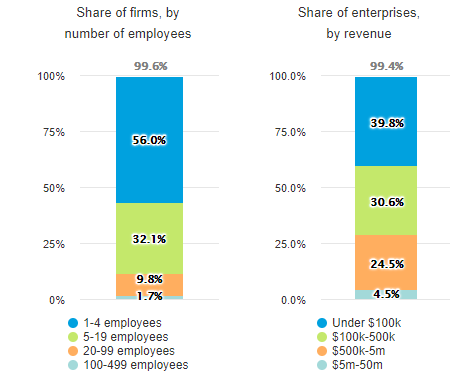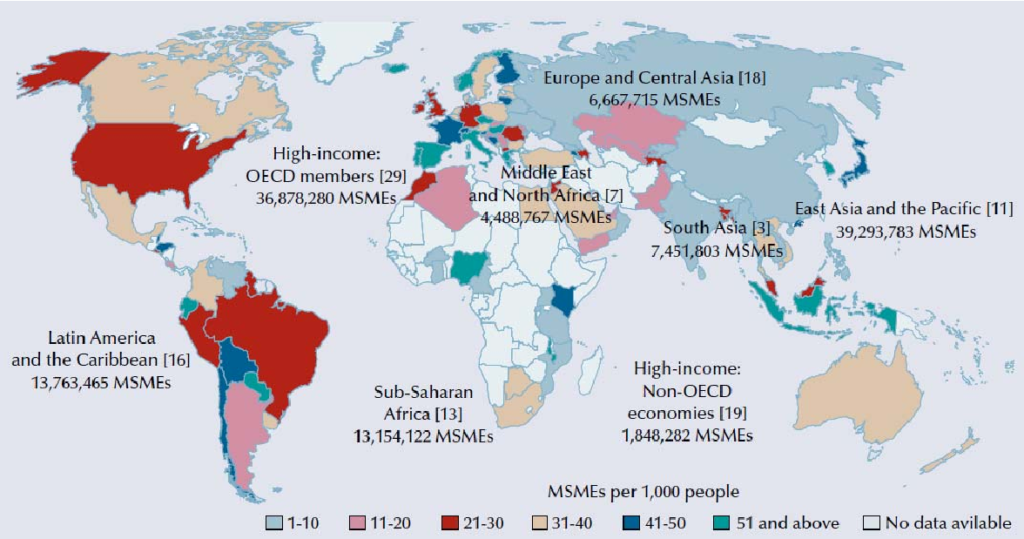Small and medium-sized enterprises (SMEs) must prioritize business strategy orientation toward global market strategy, market research aimed at obtaining foreign market intelligence, innovation and technology, product adaptation, service orientation, collaborative ventures, and long-term vision as critical factors in their success in the international market. If they are to succeed in the current wave of globalization, they must also interact effectively with other firms in tightly connected networks of shared production and innovation. Small and medium-sized businesses must now actively seek out opportunities in international markets to establish and maintain a competitive advantage in the increasingly globalized economic world.
Operating in multiple countries provides more than just the obvious benefit of expansion and growth; it also:
- Reduces your reliance on your home market.
- Mitigates seasonal fluctuations or demand cycles.
- Protects you from economic instability in any one market
Global expansion carries significant risk for a small business, which is why a strategic approach to growth is critical.
Key facts:
Small and medium-sized businesses (SMEs) play a crucial role in the economies of all nations. SMEs make up over 99% of businesses and 70% of all jobs in OECD nations, and they provide more than half of the global GDP in high-income nations. However, between February 2020 and April 2021, between 30 and 50% of SMEs across 32 nations experienced revenue losses.
Governments across the world have prioritized assisting SMEs throughout the COVID-19 pandemic through initiatives including direct financial aid, governmental guarantees on loans, and tax reductions because they recognize that threats to SMEs represent vulnerabilities to economies and communities.
- Small businesses own 99% of the American business industry: According to survey results, small and medium-sized businesses account for 90% of all businesses in the United States. They are collectively referred to as SMEs. According to Salesforce research, SMEs play a critical role in creating job opportunities around the world. They help to drive global market innovations and long-term industrialization.

- The importance of SMEs in the economy: Holding technical resources has become a key strategic stake for businesses in a world characterized by intense competition, in which the players alter the market’s rules and force them to change the foundations of their competitiveness and economic performance. The backbone of any economy, whether it be the economy of a particular country or the global economy, SMEs, must respond to these changes and offer competitive goods and services while also adapting the quality of the production aspects. Therefore, for SMEs to survive, competitiveness is a necessary requirement.

Key tips for developing a successful market expansion strategy:
- Assess your current business performance:
Businesses must never aim to grow before the existing markets has reached its peak. This means that based on quantifiable information about your existing business performance, you must decide whether market expansion is the best course for your organization.
Monitoring metrics, or key performance indicators, is a natural component of corporate development (KPIs). Examples of KPIs that can be used to assess if your company is prepared to expand internationally are as follows:
a. Growth rate
b. Sales revenue
c. Sale conversion rate
d. Market share
e. Website traffic
- Conduct market research:

The very first step in entering a market is to ensure that you have all of the information you need about the opportunities and challenges of expanding within the country.
You must determine the size of your industry in the target country, whether there is a demand for your product or service in the new market, who your competitors are, and whether your product needs to be adapted to local needs.
Then you must address the practical issues. For example, what are the market’s most common distribution channels, and how do you gain access to them? What are the local regulations that may act as a barrier to entry?

- Set SMART goals and objectives:
An organization must have clearly defined goals and objectives and expanding internationally is no exception to this rule. You need to consider your ultimate objectives for entering the market, what you can reasonably accomplish in a given amount of time, and how you will monitor your progress. Your objectives must therefore be SMART (Specific, Measurable, Achievable, Relevant, and Time-bound).

- Develop a global business plan:
A clear written plan is essential for success in any business. This is a step that some SMEs skip because it is time-consuming and difficult to complete well. Finally, the time and effort you put into planning your expansion will pay off. It will also pale into insignificance when compared to escaping an unplanned expansion that fails.

- Adopt a Specific Product Strategy:
You should create a cutting-edge offering that motivates you to grow in new nations and areas.To assure success and ascertain whether modifications are required, test your product in the target nation. Be aware that just because a product is doing well at home doesn’t mean that it will perform even better abroad. You should employ representatives in foreign marketplaces to keep track of fresh trends, stay in touch with decision-makers, and spot chances.

To conclude:Creating an international business expansion strategy entails assessing your readiness, understanding your motivation, conducting market and customer analysis, innovation, partnerships, understanding competitors, assembling a team of experts, consolidating resources, and creating effective documentation, among other things.
Westford Uni Online is focused towards imparting education and offering degrees with focus on the business industry. The programs offered by Westford Uni Online are delivered in a synchronous learning format that enables professionals and business owners to continue expanding their educational horizons along with their business acumen giving them the opportunity to acquire the knowledge and absorb present-day trends that will inspire and enable them to further expand their businesses. The MBA in Global Business Administration with International Tourism and Hospitality Management and the MBA in Global Business Administration are two of the many programs that entrepreneurs who are looking to start or expand their small-medium scale business, can consider.
References:
Osano, H.M. (2019). Global expansion of SMEs: role of global market strategy for Kenyan SMEs. Journal of Innovation and Entrepreneurship, 8(1). doi:10.1186/s13731-019-0109-8.
www.mckinsey.com. (n.d.). Helping small and medium-size enterprises thrive | McKinsey. [online]
thesmallbusinessblog.net. (2022). Small Business Statistics 2022: Trends, Market Size & Revenue – The Small Business Blog. [online]
Robu, M. (2013). THE DYNAMIC AND IMPORTANCE OF SMES IN ECONOMY. undefined. [online]
allianzcare.com. (n.d.). SME international business expansion strategy | Allianz Care. [online]
Velocity Global. (2019). Top 5 Global Expansion Strategies. [online]





